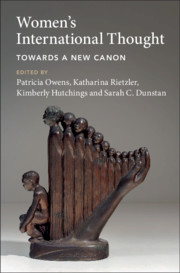Book contents
- Women’s International Thought: Towards a New Canon
- Women’s International Thought: Towards a New Canon
- Copyright page
- Contents
- Preface and Acknowledgments
- Introduction
- 1 Field and Discipline
- 2 Geopolitics and War
- 3 Imperialism
- 4 Anticolonialism
- From “Internationalisme noir” (1928)
- The Irish Republic (1937)
- From “To Joe and Ben” (1937)
- From White Man’s Duty (1942)
- From “The Colonial Question and the Destiny of the French People” (1943)
- From “Le grand camouflage” (1945)
- From African Journey (1946)
- From “The Caribbean Community in Britain” (1964)
- Jane Nardal
- Dorothy Macardle
- Una Marson
- Nancy Cunard
- Simone Weil
- Suzanne Roussy Césaire
- Eslanda Robeson
- Claudia Jones
- 5 International Law and International Organization
- 6 Diplomacy and Foreign Policy
- 7 World Peace
- 8 World Economy
- 9 Men, Women, and Gender
- 10 Public Opinion and Education
- 11 Population, Nation, Immigration
- 12 Technology, Progress, and Environment
- 13 Religion and Ethics
- Index
Claudia Jones
from 4 - Anticolonialism
Published online by Cambridge University Press: 12 April 2022
- Women’s International Thought: Towards a New Canon
- Women’s International Thought: Towards a New Canon
- Copyright page
- Contents
- Preface and Acknowledgments
- Introduction
- 1 Field and Discipline
- 2 Geopolitics and War
- 3 Imperialism
- 4 Anticolonialism
- From “Internationalisme noir” (1928)
- The Irish Republic (1937)
- From “To Joe and Ben” (1937)
- From White Man’s Duty (1942)
- From “The Colonial Question and the Destiny of the French People” (1943)
- From “Le grand camouflage” (1945)
- From African Journey (1946)
- From “The Caribbean Community in Britain” (1964)
- Jane Nardal
- Dorothy Macardle
- Una Marson
- Nancy Cunard
- Simone Weil
- Suzanne Roussy Césaire
- Eslanda Robeson
- Claudia Jones
- 5 International Law and International Organization
- 6 Diplomacy and Foreign Policy
- 7 World Peace
- 8 World Economy
- 9 Men, Women, and Gender
- 10 Public Opinion and Education
- 11 Population, Nation, Immigration
- 12 Technology, Progress, and Environment
- 13 Religion and Ethics
- Index
Summary
Over a quarter of a million West Indians, the overwhelming majority of them from Jamaica, have now settled in Britain in less than a decade. Britain has become, in the mid-1960’s, the center of the largest overseas population of West Indians; numerically relegating to second place, the once superior community of West Indians in the United States. This new situation in Britain, has been inimitably described in the discerning verse of Louise Bennett, noted Jamaican folklorist, as, “Colonization in Reverse.” Immigration statistics, which are approximate estimates compiled by the one time functional West Indian Federation office (Migrant Services Division) in Britain, placed the total number of West Indians entering the United Kingdom as 238,000 persons by the year 1961. Of these, 125,000 were men; 93,000 women; 13,200 were children; and 6,300, unclassified. A breakdown of the islands from which these people came, showed that during the period of 1955–1961, a total of 142,825 were from Jamaica; from Barbadoes, 5,036; from Trinidad and Tobago, 2,282; from British Guiana, 3,470; from Leeward Islands, 3,524; from the Windward Islands, 8,202; and from all other territories, the sum total of 8,732. Distribution of the West Indian population in the United Kingdom indicates that by mid-1962, over 300,000 West Indians were settled in Britain. The yearly immigration and the growth of community settlement illustrates the rate of growth of the West Indian settlement. For example, the emigration of West Indians to the United Kingdom in mid-1955 totalled 24,473 and by 1961, this figure soared to 61,749. Corresponding to the latter, was the fear of family separation due to the then impending Commonwealth Immigrants Act. In the industrial city of Birmingham, by mid-1955, 8,000 West Indians formed the community there, while in mid-1962, this figure stood at 67,000. Similarly in London, where in Brixton the largest settlement of West Indians exist [sic]; the mid-1955 figure of 85,000 had by 1961 grown to 135,000.
- Type
- Chapter
- Information
- Women's International Thought: Towards a New Canon , pp. 232 - 244Publisher: Cambridge University PressPrint publication year: 2022

